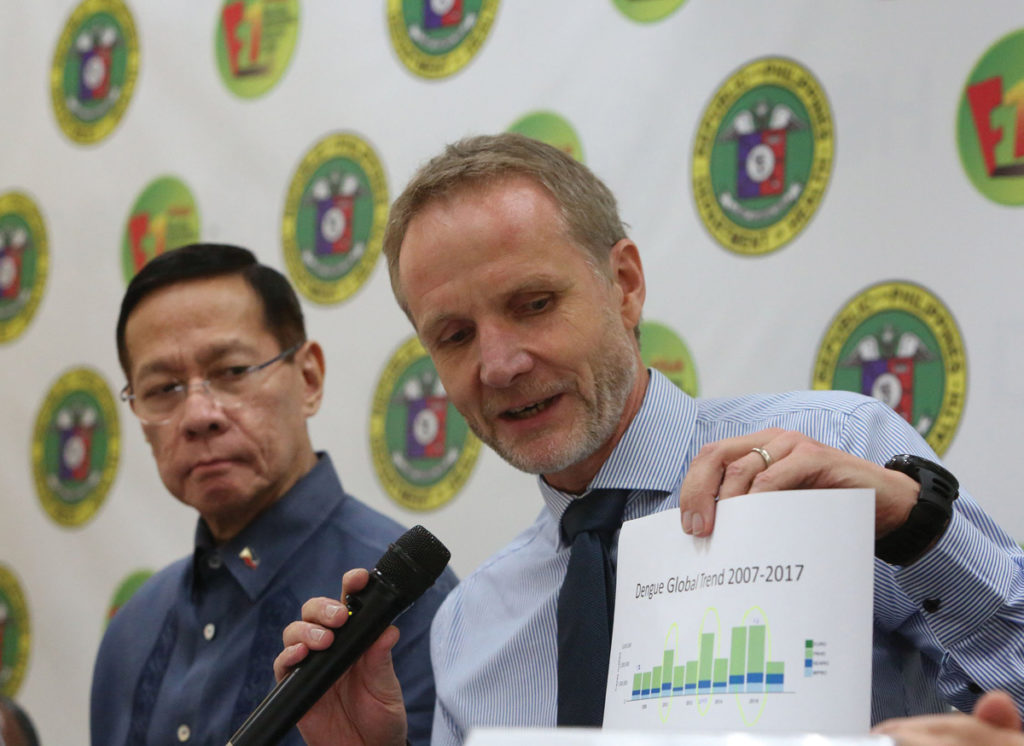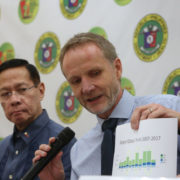
The Department of Health (DOH) on Monday, July 15, declared a national dengue alert after 450 people, including infants and a centenarian, died in the first six months of the year due to rapidly increasing cases of dengue in several regions.
“This is the first time we’re declaring a national alert because the objective is clear: We want to raise awareness among the public and, more importantly, in communities where signs of early dengue increases are evident,” said Health Secretary Francisco Duque III at a press briefing.
DOH records show that from Jan. 1 to June 29, 106,630 cases were reported nationwide, including 456 deaths.
“This is 85 percent higher compared to the same period last year, which is 57,564,” Duque said.
The biggest number of reported dengue cases came from Western Visayas (13,164), Calabarzon (11,474), Central Visayas (9,199), Soccsksargen (9,107) and Northern Mindanao (8,739).
Duque also announced that Code Blue Alert has been raised as well for the National Disaster Risk Reduction and Management Council (NDRRMC) health cluster.
With this, there will be heightened surveillance by the DOH’s regional offices for dengue and heightened implementation of anti-dengue strategies. Half of all hospital personnel will also report for duty.
Regions that have exceeded the epidemic threshold are Mimaropa (Mindoro, Marinduque, Romblon and Palawan), Western Visayas (Region VI), Central Visayas (Region VII) and Northern Mindanao (Region X).
Meanwhile, regions being monitored after having exceeded the alert threshold are Ilocos, Cagayan Valley, Calabarzon (Cavite, Laguna, Batangas, Rizal and Quezon), Bicol, Eastern Visayas, Zamboanga Peninsula, Davao, Bangsamoro Autonomous Region in Muslim Mindanao and Cordillera Administrative Region.
A global issue
According to World Health Organization (WHO) country representative Gundo Weiler, the Philippines must brace for severe dengue this year.
He said the rise in dengue can be attributed to various factors such as migration and climate change.
“Dengue globally is a huge issue. More than half of the world’s population is living in areas where there is exposure to dengue,” he said.
“There are lots of efforts we can do and we can alleviate severity of dengue outbreak. Like if we pursue some of the simple community measures – search and destroy the breeding sites of mosquitoes and self protection against mosquito bites,” he added.
Senate President Pro Tempore Ralph Recto on Monday proposed that screened windows and doors be installed in public schools to prevent the spread of dengue.
“During school days, one in four Filipinos are in public schools,” Recto said, citing his computation from 27 million students taught by 830,000 teachers in about 47,000 schools this year.
“If Filipinos congregate there, then we should make sure that mosquitoes don’t go to school with them. Aedes aegypti should not be enrolled, or if they’re there, they should be expelled,” he added.





